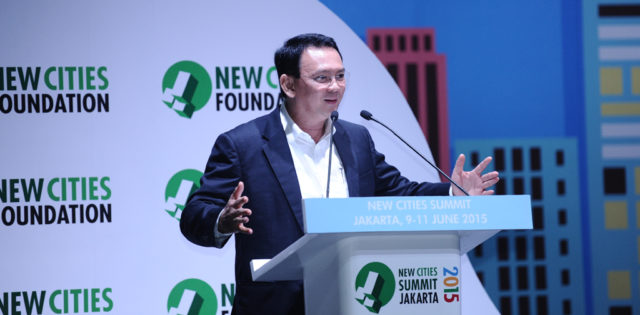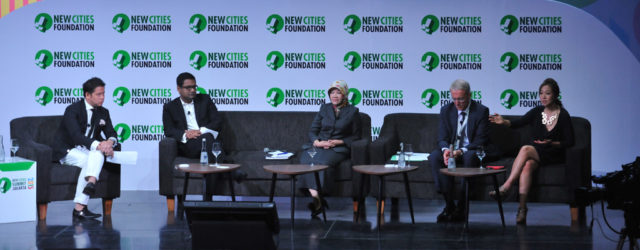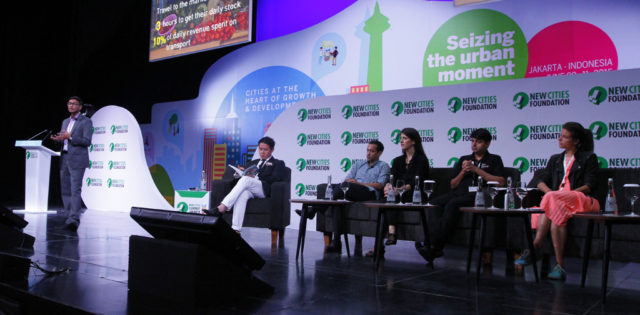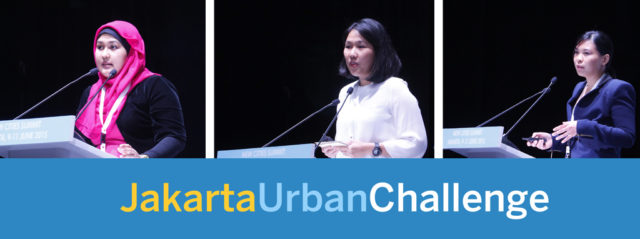Seizing the Urban Moment: New Cities Summit Highlights Day One
June 10, 2015 — Blog
The Trillion Dollar Challenge
By 2020, a staggering US$1.5trillion will have been spent on Smart Cities projects. It is no wonder, then, that so many politicians, officials, academics and corporations want to talk about urbanization.

Global cities are growing at a massive pace, especially in Asia. That is why, this year, the New Cities Summit headed to Jakarta.
After a lively traditional dance (see above), Jakarta’s Governor Basuki Tjahaja Purnama kicked off the Summit, outlining the challenges his city faces.
First is corruption. Cities are spending more than ever, so it is vital to ensure that the funds go to the right place. In Jakarta: “If you don’t bribe [officials] they are fairly slow and you don’t know when everything is accomplished,” the Governor said.
To tackle this problem, the city government merged its public services into one-stop shops, with CCTV cameras focused on employee’s faces to watch them as they work. “It might be a little bit cruel, but that’s the culture, we have to force them,” the Governor added.
Second, as a city grows, it is increasingly important to keep track of the government’s payroll. Jakarta is taking back the management of some services from the private sector, such as cleaning the rivers and managing city waste, the Governor said. This means it can directly monitor employees using GPS, ensuring that they are at work and delivering value for money.
The third key issue is livability – so the city is massively increasing its number of parks. Six parks were built this year, 54 will be built next year, and a staggering 150 will be built in 2017, the Governor pledged. A projected population of twelve million people needs somewhere to relax and play, he said. Cities cannot just focus on the gritty issues like health and education.
Of course, health and education are still a priority, he said. The city tries to provide benefits for its poorest citizens, like free health insurance and schooling support, but these often end up getting sold on to the middle classes. Data has helped stop this: the city now ties everything to a citizen’s ID so it’s impossible for them to sell benefits on.
Finally, as anyone who has ever visited Jakarta will know, transportation is an enormous issue. The roads are filled with cars, trucks, taxis, and a throng of light motorcycles. So the city is aiming to complete the building of a light railway as soon as possible.
Equally, the private buses tend only to drive during peak hours, sitting idle when it is uneconomical for them to pick up passengers. The city is now taking action by establishing its own companies to running routes on a regular basis.

Global Roundup
While Jakarta played host, delegates heard from cities around the world. Here are some key insights from the first day:
- “Over the next three decades, some 500 global cities…will be responsible for two thirds of the world’s economic output” – John Rossant, Chairman, NewCities
- “By 2050, India will have an urban population of 250 million – higher than combined the population of Indonesia and Brazil” – Greg Lindsay, Senior Fellow, NewCities
- “Chinese city officials have to undergo 12 days of mandatory training a year, like getting a driving license. And those getting promoted have to take between three months and a year” – Peggy Liu, Chairperson, JUCCCE
- “In Uganda, we are struggling to claim the land for public space. Do you just take it?” Question from the floor.
- “Hong Kong transport experience is the best in the world” – Sutanto Soehodho, Deputy Governor for Trade, Industry and Transportation, City of Jakarta
- “The greater Kuala Lumpur population has grown at an exponential rate. It was 6 million, now it’s 7 million, and by 2020 it’s going to be 10 million” – Mohd Azharuddin, Director, Performance Management and Delivery Unit, Prime Minister’s Department, Malaysia
Tweets and Tidbits of the Day
Every conference presentation always included a fascinating statistic or memorable quote. Here are some tweets from delegates who shared their favorite highlights:
Many people think of China as a communist country, but really it's run more like a multinational corporation. @shanghaipeggy #ncs2015
— Rose Bloomin (Broome) (@rosical) June 9, 2015
Having a transit card is more important than having college education @Greg_Lindsay @newcitiesfound #ncs2015 @urb_im http://t.co/c9pXptAg7J
— Victor d'Allant (@dallant) June 9, 2015
Interesting point made by one of the panelists #NCS2015. In a conversation with 5 African leaders, only Kagame was urbanist, rest ruralists
— vusi vuma (@vusivuma) June 9, 2015
What Works in Cities?

One of the most popular parts of the day was a session for innovative new startups that are creating new urban solutions. We watched five presentations today, all brilliant in their own ways:
- GO-JEK – a service providing motorcycle drivers in the city with regular work as couriers and drivers for citizens, via a smartphone app. It also trains and vets staff before they are employed.
- HandUp – a site that allows citizens to give donations to homeless people after reading their stories. People are registered on the site after referrals by local government employees.
- I Got Garbage – A platform that looks to employ people in India forced to scavenge through refuse to find recyclable goods. It provides a sustainable employment model by allowing companies and homes to employ them for refuse services, and also to start their own micro-businesses.
- Blaze – a startup that sells an innovative new cycling light which shines a lazer in front of drivers to show that a cyclist is in their blind spot.
- SokoText – A platform that allows people to demand locally sourced using SMS messages.
Jakarta Urban Challenge
The New Cities Summit’s quest to identify the innovators of the future was completed on day one with the Jakarta Urban Challenge, which brought three young teams to the main stage to pitch their original solution to Jakarta’s mobility problems. On day two (today), we will find out which one scoops the first prize of US$10,000 to realize their project idea in Jakarta. The runners-up will win US$6,000 and US$4,000 respectively.

The day concluded with a colorful evening outdoors in the courtyard of the historic Museum Bank Indonesia, complete with traditional music, dancing and a spot of karaoke.